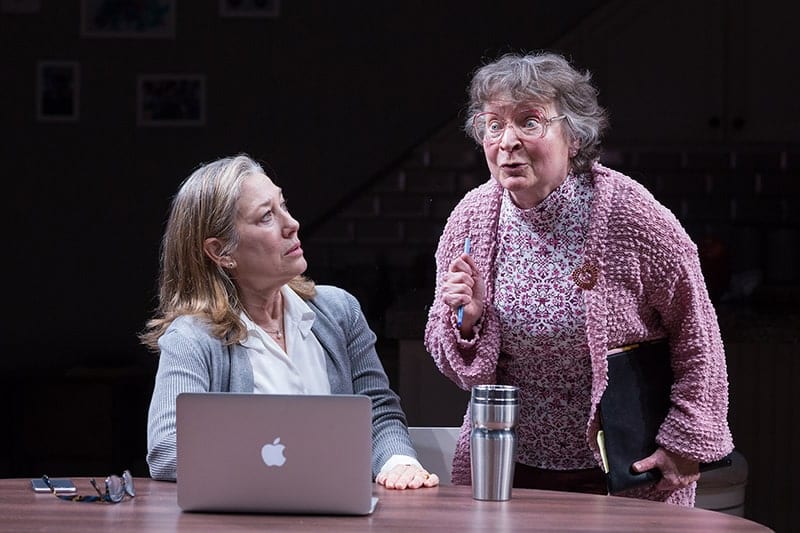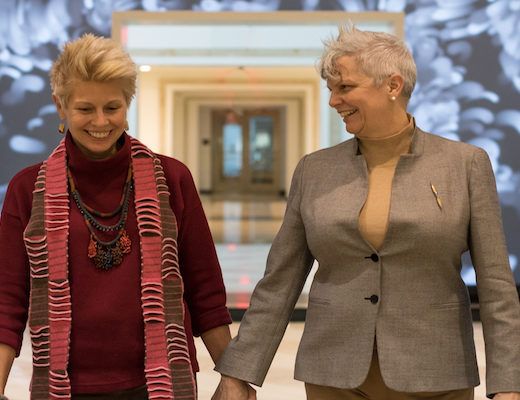by John Bavoso
This article was first published on DC Theatre Scene and can be read on their site here.
A couple of weeks ago, the satire site McSweeney’s published an article entitled, “How Can I Help to Promote Diversity Without Relinquishing Any of My Power?” This title alone could serve as an incredibly succinct synopsis of Joshua Harmon’s Admissions, now playing at Studio Theatre, where Harmon’s previous play Bad Jews holds the distinction of being the company’s best-selling production ever.
Like Bad Jews, Admissions skewers a very specific subset of the population—in this case, upper-middle class white progressives. Harmon comes by his disdain for this particular kind of liberal sanctimoniousness honestly, having grown up in Westchester, NY, a wealthy suburban community just outside of the city. “The people who were the most progressive and vocal also tended to be the first people to pick up the phone and make a call to make sure that their kids got everything they wanted out of life,” Harmon explains to dramaturg Lauren Halvorsen.
Admissions is set at Hillcrest, an elite boarding school in rural New Hampshire. Sherri Rosen-Mason (Meg Gibson) oversees admissions for the school, and is proud of the fact that, under her decade-and-a-half watch, the number of students of color has jumped from 6% to 18%. We’re introduced to her particular brand of cold professionalism in the opening scene, in which she chastises Roberta (Sarah Marshall), a member of the institution’s development department whose ties to the school go back generations, for not including enough people of color in the new admissions brochure.
When Roberta protests that she included Perry, the son of a white mother—Ginnie Peters (Marni Penning), Sherri’s best friend—and half-Black father, Sherri counters that while Perry counts as Black for the purposes of her statistics, he doesn’t photograph Black enough to count for the brochure. Right off the bat, we know we’re in for a wild ride.
Back at home, Sherri opens a bottle of wine to share with Ginnie while they both wait to hear whether their sons—best friends Perry and Sherri’s son, Charlie (Ephraim Birney)—have gotten into Yale. Ginnie is delighted to get the call that Perry has been accepted, while Sherri and her husband, Bill (Kevin Kilner, who you may recognize from The Good Wife or House of Cards), who is also the school’s headmaster, are left to wait until Charlie comes home from screaming in the woods for four hours to learn that his application has been deferred.
This propels Charlie into suggesting that Perry only got in because he’s mixed race and launches him into a screed (that impressively goes on for 15 to 20 minutes, easily) about the entire notion of diversity and seats at the table and who even counts as a person of color anyway. It also sets into motion a series of events that tests his parents’ convictions and puts all of their relationships in jeopardy.
Director Mike Donahue keeps things moving at a quick clip as the characters move around the bland affluence of scenic designer Caite Hevner’s kitchen set and open endless bottles of white wine. Birney’s work is a true standout for that marathon-length monologue alone, but he’s given a harder bill of goods to sell in the second half of the play (I’ll get to that in a moment). The B plot scenes between Gibson and Marshall are quite funny, highlighting generational differences and the imprecision of language around race and diversity.
Overall, though, Harmon’s words are the real star of the show, and this can be both a boon and a detriment. The monologues sparkle and Harmon’s capacity for glancing one-liners seems infinite, but some of the dialog can feel more wooden than natural. And this may be in part because he sometimes takes his characterizations to the extreme—Bill, for instance, basically calls everyone in the world a racist at one point or another without allowing for any nuance whatsoever.
The thing that most pulled me out of the story, however, is the aforementioned action that Charlie takes (and I won’t spoil here) about two-thirds of the way through the play, which reveals his parents’ true hypocrisy. My problem is that the change of heart that inspires this act seems totally unearned—there’s no moment of epiphany that the audience is privy to, nor are there any consequences for Charlie’s previous diatribes that incentivize him to change his attitude. It struck me that what he does he only does so that he can move the plot along and say the lines Harmon wants spoken at the end of the play. These moments feel more like the playwright speaking directly to the audience rather than a character speaking genuinely from his heart, and threatens to turn character into caricature.
Harmon and the entire Admissions team give audiences a lot to think and talk about as they exit the theater. In fact, a gentleman behind me, when the lights went up at the end of the show, wondered aloud whether the composition of the audience itself even remotely approached the 6% Hillcrest’s student body began with. These are important conversations to be having, and while Admissions may not offer up any solutions, it does give the audience the chance to laugh—primarily at itself.





No Comments